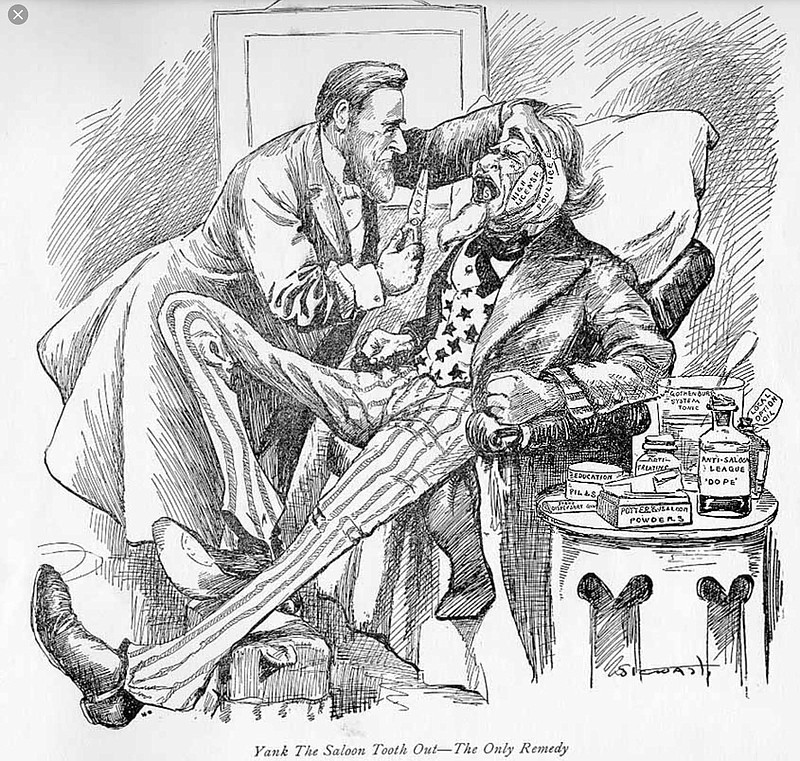Wednesday marks the 100th anniversary of the ratification of the 18th Amendment to the U.S. Constitution. The 18th Amendment prohibited the manufacturing, transportation or sale of intoxicating liquors. It is the only amendment to not only limit individual freedoms, but also be repealed.
The effort to sober up America began in the early part of the 19th century when Americans consumed 88 bottles of whiskey per capita a year, which is three times the amount of alcohol they consume today. From 1850 to 1890, the United States population tripled. However, alcohol consumption grew 24 times during the same time period. Before prohibition, alcohol was the fifth largest industry in America.
Learn more
Greg Martin will present a program on the history of the 18th Amendment to the Chattanooga Area Historical Association on Monday at 6 p.m. at the Chattanooga Public Library.
Often governments depended on taxes from alcohol. At one point, the federal government generated 40 percent of its revenue from liquor sales, and state governments, such as New York, collected 75 percent of its revenue from alcohol sales. Before prohibition, the city of Chattanooga's 49 saloons and three liquor wholesalers combined to provide one-eighth of all property taxes collected by the city treasury.
The first distillery of record in Chattanooga was J.W. Kelly and Co. It was founded just after the Civil War in 1866. Twenty years later, the distillery business was the largest manufacturing industry in Tennessee. Before prohibition, Chattanooga was home to 30 distilleries and a massive brewing company that produced 150,000 barrels of beer a year.
So how did prohibition take hold in Tennessee? The state's road to prohibition included the murder of former U.S. Sen. Edward Carmack. There is a statue of him in at the state capitol in Nashville. In 1908, Carmack lost the governor's race to Malcolm Patterson. As a newspaper editor, Carmack criticized Patterson's opposition to prohibition and other things. One of the governor's friends and his son confronted the senator on the street in Nashville where shots were fired. Carmack died. He was a martyr for the Prohibition Cause while the governor pardoned the friend who killed him. Patterson was never elected to office again.
When the Tennessee General Assembly was convened a few months later, the legislature passed bills that forbade the sale and manufacturing of intoxicating liquors. Gov. Patterson's vetoes were overriden 28-2 in the Senate and 88-5 in the House. At that time, only Memphis, Chattanooga, Nashville and LaFollette were "wet." Knoxville voted itself dry two years earlier. Tennessee's state government got so serious about state prohibition and enforcement that the mayors of Memphis and Nashville were removed from office in 1916 for refusal to enforce the state's 1909 prohibition law.
On Oct. 25, 1910, Chattanooga went bone dry. The headline of The Chattanooga Times read: "CHATTANOOGA SALOONS ALL OUT OF BUSINESS." Judge McReynolds gave the order and the sheriff served papers for all saloons to cease operations. It wasn't until May 3, 1939, that the county voted for a referendum to repeal local prohibition.
Many issues contributed to our nation's acceptance of Prohibition including racism, women's suffrage, progressivism, German immigration and the influence of Protestant religions. The passage of the 16th Amendment provided a new source of revenue for the federal government called the federal income tax. The new tax replaced the revenue stream of liquor taxes.
Prohibition failed for many reasons, including rising criminal syndications, lost government revenues, the Depression after the collapse of the stock market, and the fact that it made average citizens law breakers. For example, Etta Mae Miller of Lansing, Michigan, was the mother of 10 children. She was given a life sentence for her fourth violation of prohibition when she sold two pints of liquor to an undercover cop.
Chattanooga has its own history of politicians and cops violating the prohibition law. In 1915, there was a headline in the Hamilton County Herald proclaiming: "POLICE COMMISSIONER BETTERTON CHARGED WITH SHIPPING WHISKEY PACKED IN COFFINS FROM HIS FACTORY - PROVE CONCLUSIVE".
Sen. Morris Sheppard of Texas, who sponsored the 18th Amendment, believed national prohibition would never be repealed. In 1930, he stated, "There is as much chance of repealing the 18th amendment as there is for a hummingbird to fly to the planet Mars with the Washington Monument tied to its tail." Eventually, the hummingbird did fly in 1933 with the passage of the 21st Amendment which repealed the Prohibition Amendment.
Greg Martin is the Hamilton County commissioner for District 3. Contact him at Countycommissionergregmartin@gmail.

